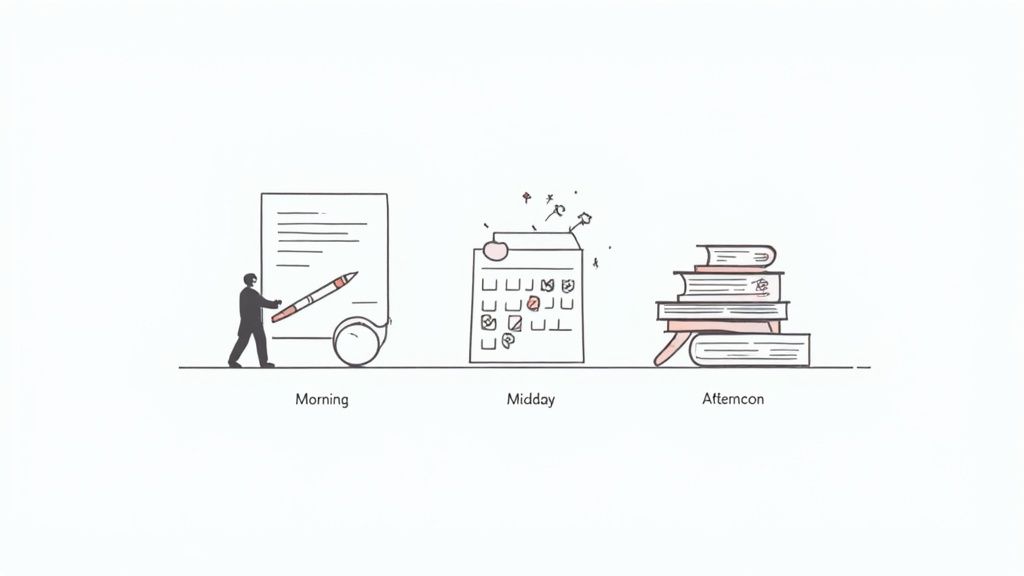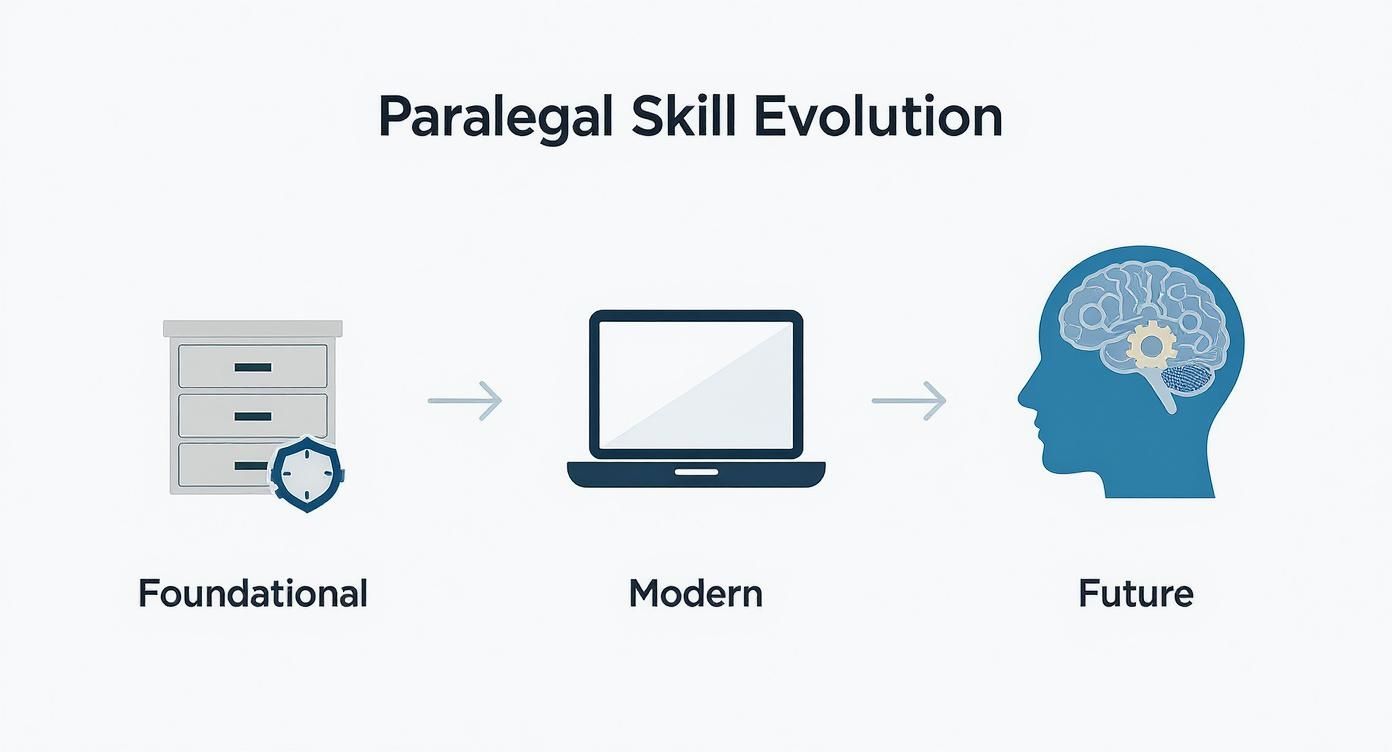
 14 minutes read
14 minutes read
A litigation paralegal is the tactical nerve center of a lawsuit. They’re the ones executing the game plan from evidence gathering to trial prep, all under an attorney’s direction. Forget the stereotypes—they’re the ultimate project managers who turn a legal strategy into a winnable case.

Let's get one thing straight: this is not an entry-level admin role. Those dramatic courtroom epiphanies you see on TV? Pure fiction. The reality is, behind every sharp attorney stands a litigation paralegal running the command center for the entire case.
Think of them as the air traffic controllers of the legal world. Without them, the whole process grinds to a halt and crashes. They manage the lawsuit's critical path from the initial client meeting all the way to the final gavel.
This role isn't a "nice-to-have"—it's mission-critical. And the market knows it. The U.S. Bureau of Labor Statistics projects a need for around 39,300 new paralegals each year through 2033. The demand is real because the value is undeniable.
At the heart of any winning lawsuit is an almost fanatical approach to document management. Today's top paralegals aren't using dusty filing cabinets; they're masters of the best document management software solutions that keep every bit of information organized, accessible, and locked down.

The real work happens long before anyone steps into a courtroom. A paralegal’s job is to make sure that by the time an attorney is ready for trial, the case is already won on paper.
They are the guardians of deadlines and the architects of the case file. This means meticulously wrangling mountains of evidence, which is why a deep understanding of what a case management system is is a non-negotiable skill for anyone who wants to survive, let alone thrive, in this field.

So, what does a litigation paralegal actually do all day? If you're picturing someone just fetching coffee and making copies, you're dead wrong. The reality is much closer to high-stakes project management, where the paralegal is the central hub for the entire legal team.
Forget a predictable schedule. Your day is a constant tug-of-war between deep-focus analytical work and rapid-fire communication—often before you've even had your first sip of coffee.
You might kick off your day drafting a crucial motion to compel discovery. In plain English, you're writing a formal document asking the court to make the other side finally hand over the evidence they’ve been hiding. It's the polite, professional way of saying, "Stop stalling and show us what you've got."
This isn't just filling out a form. It demands a razor-sharp grasp of the case facts, the labyrinthine rules of civil procedure, and exactly what's missing. An hour later, you could be diving into an e-discovery platform, sifting through thousands of files for the one email that blows the case wide open.
A huge chunk of the job is pulling key details out of dense legal documents. Learning how to efficiently extract data from PDFs isn't just a neat trick; it's a superpower that can completely transform your workflow.
As the day wears on, your focus often pivots from analysis to coordination. You’re on the front lines, scheduling a complex web of depositions with witnesses, clients, and expert consultants. It's a logistical puzzle where one wrong move can have disastrous consequences.

Let’s be real: if a key expert witness isn't available on the right day, or a deposition isn’t properly noticed, it's not just an oopsie. It can torpedo the entire case strategy.
This is where insane organizational skills come into play. You’re not just booking conference rooms; you’re arming attorneys with meticulously organized exhibit binders, summarizing prior testimony, and making sure everyone has what they need, exactly when they need it. It’s strategic execution, not just calendar management.
To do this effectively, you need to be fluent in the best legal research databases. It’s not about finding information—it’s about knowing which information gives your team the winning edge. The day rarely ends at 5 p.m. It ends when the critical work is done. It’s a job built on grit, not glamour.
Litigation paralegals are in the thick of it at every stage of a lawsuit. Here's a quick and dirty breakdown of how their tasks shift as the case moves forward.
| Phase of Litigation | Key Paralegal Tasks | Why It Matters |
|---|---|---|
| Pre-Litigation | Interviewing clients, gathering initial facts and documents, conducting preliminary legal research. | This is where you build the foundation and figure out if you've even got a case worth mortgaging the office ping-pong table for. |
| Pleadings | Drafting the initial complaint, summons, and answer. Managing service of process on all parties. | This ensures the lawsuit kicks off correctly and doesn't get tossed out on a technicality before it even starts. |
| Discovery | Drafting interrogatories and requests for documents. Managing document production and review (e-discovery). | This is the fact-finding slugfest. Meticulous discovery work uncovers the evidence needed to build a knockout argument. |
| Trial Preparation | Preparing exhibit lists and binders, coordinating witness schedules, drafting trial subpoenas, assisting with jury selection materials. | Organization is everything. A well-prepped paralegal ensures the trial runs like a well-oiled machine, not a chaotic mess. |
| Post-Trial | Assisting with motions for appeal, organizing the case file for closure, and managing post-judgment collections. | The fight doesn't stop with the verdict. This phase ensures the win is locked down or prepped for the next round. |
As you can see, the role is anything but static. A great litigation paralegal is a master multitasker, a detail-obsessed fanatic, and an absolutely indispensable part of any legal team that actually likes to win.
Let's be blunt: knowing a few legal terms doesn't make you a litigation paralegal, just like owning a spatula doesn't make you a chef. Thriving in this role demands a very specific skill set that separates the MVPs from the benchwarmers.
First and foremost, you need organizational skills that border on obsessive. This isn't about having a tidy desk; it's about being the undisputed guardian of every deadline, case file, and scrap of evidence. A single missed filing or a lost document can crater a multi-million dollar case. You have to be the person who sweats the small stuff, because in litigation, it's all big stuff.
Next, you need to be deeply comfortable with technology. If your picture of law is still dusty books and manila folders, you need to update your OS. Modern litigation is a tech-driven beast of e-discovery platforms, sophisticated case management software, and high-tech trial presentation tools.

A great paralegal doesn't just react; they anticipate what the attorney needs before they even ask. They’re thinking three moves ahead on the chessboard while everyone else is still staring at the pieces.
The role has evolved, big time. A recent survey showed that 75% of law firms slashed manual tasks for paralegals after bringing in automation. This frees them up for higher-value work, like contributing to case strategy and digging into complex legal research. You can get the full scoop on this and other trends in this paralegal services report.
But it's not all about tech wizardry. You also need an almost unnatural ability to stay calm when everything is on fire. This requires a potent mix of soft skills:
Ultimately, this cocktail of skills is what defines an elite paralegal. And while you can hone these in the trenches, many firms now see formal credentials as the price of admission. It’s smart to check out the current paralegal certification requirements to understand the baseline.
A lawsuit isn’t a single event. It’s a marathon of brutal sprints, and each stage has its own set of traps. The litigation paralegal is the one guiding the team through that gauntlet, anticipating the twists and turns long before the attorney sees them coming. Honestly, without a top-notch paralegal, most lawyers would be flying blind.
The real work starts long before anyone even thinks about a courtroom.
This is the groundwork phase. Forget the courtroom drama; this is all about quiet, methodical investigation. Here, the paralegal is digging for facts, pulling together initial evidence, and helping the attorney figure out if there's even a case worth pursuing.
They’re often the ones drafting the initial complaint—the document that officially fires the starting gun on the lawsuit. This isn't a fill-in-the-blanks exercise. It's about translating a client’s messy story into a formal legal argument that can withstand an immediate punch from the other side.
If a lawsuit has a heart, it's discovery. This is the legally-sanctioned cage match where both sides are forced to show their hands. And guess who manages this complex, often nasty, exchange of information? The paralegal.
They are deep in the trenches, handling massive document productions that can swell into tens of thousands—or even millions—of pages. They draft interrogatories (formal written questions) and requests for production (demands for documents) designed to pry crucial info from the opposition. They're also the logistical wizards who schedule depositions—the formal, under-oath interviews with key witnesses that can make or break a case.

This is so much more than administrative work. A sharp paralegal who finds one contradictory email buried in a mountain of documents can single-handedly change the outcome. That’s where the "smoking gun" is usually found.
This infographic breaks down how a paralegal’s required skills have evolved to keep up with today's insane demands.

As you can see, the role has moved way beyond physical organization. Today, it’s about mastering complex digital tools and applying strategic thinking, cementing the paralegal's essential place on the team.
As a trial date looms, the pressure cooker gets turned up to eleven. This is where every piece of evidence, every witness testimony, and every legal argument gets woven into a cohesive, compelling story for the judge or jury. The paralegal is the one who makes sure that story is bulletproof.
Their responsibilities are massive:
By the time the trial begins, the paralegal has managed every operational detail, freeing up the attorney to focus on one thing and one thing only: winning.
Let's cut the crap. A top-notch litigation paralegal is more than a supporting player; they are often the secret weapon behind a successful outcome. While the attorney is mapping out strategy and owning the courtroom, the paralegal is in the trenches, wrestling with the million details that ultimately decide who wins and who loses.
Think about it. It’s the paralegal who digs through a mountain of discovery to unearth that one "smoking gun" email. It's the paralegal who meticulously prepares a key witness so their deposition testimony is airtight. This isn’t admin work—it’s front-line, high-impact work that directly shapes the outcome.
Every perfectly organized exhibit, every correctly filed motion, and every deadline met without a last-minute panic attack is a small victory that builds toward the big win. This behind-the-scenes precision allows the legal team to argue from a position of strength, never blindsided by a missing document or a stupid procedural mistake.
This operational excellence doesn't just feel good; it translates directly into better results for clients and a more profitable firm. With the legal industry booming, smart firms are leaning heavily on skilled paralegals to handle the load. In fact, one report found that 75% of law firms saw a major productivity jump after adopting tech that better supports their staff. You can read more about it in the 2025 State of the Legal Market report.

A lawyer without a top-tier litigation paralegal is like a surgeon without a scalpel. They might know the theory, but they lack the essential tool to actually get the job done.
Here’s the bottom line: the paralegal builds the case, piece by meticulous piece. By the time it reaches trial, the attorney’s job is to present the solid, well-constructed argument the paralegal has already assembled. They aren't just part of the team; in many ways, they are the architect of the win. Toot, toot!
Alright, let’s tackle the questions still rattling around in your head. By now, you're either seriously considering becoming a litigation paralegal or you're trying to figure out how to hire a great one. Let's clear up a few things.
It’s easy to get lost in the jargon, so here are some straight answers.
Think of it like this: “paralegal” is the general job title, like “engineer.” A litigation paralegal is a specialist, like a structural engineer who only builds bridges. They live and breathe the world of lawsuits and courtroom battles.
While a corporate paralegal might spend their day drafting contracts or handling SEC filings, a litigation paralegal is deep in the adversarial trenches. Their world is dictated by the brutal rhythm of discovery, motions, and trial prep. In short, one helps make deals, the other helps win fights.
Let me scream this from the rooftops: absolutely not. This is one of the brightest, most uncrossable ethical lines in the legal world. Stepping over it spells disaster for both the paralegal and the lawyer they work for.
Paralegals do critical, high-level legal work, but it is always under the direct supervision of a licensed attorney. They can draft a complex motion, summarize a damning deposition, or unearth a case-winning document. What they can't do is counsel a client on their next move. They help build the argument; they don't give the legal opinion.

The second a paralegal tells a client, "I think you have a strong case and should sue," they've gone way too far. Their job is to support the attorney’s strategy, not create it for the client.
This job isn't for everyone, and that's okay. The people who truly crush it as litigation paralegals are a special breed. They are meticulously organized, stay cool under insane pressure, and get a weird sense of satisfaction from creating order out of chaos.
If you’re the kind of person who enjoys juggling multiple high-stakes projects, solving complex logistical puzzles, and staring down a deadline without flinching, you'll probably love it. It’s a role for proactive problem-solvers who see a disorganized case file not as a mess, but as a challenge to be conquered.
So, what does a litigation paralegal really do? They're the operators who make the entire litigation machine run. They ensure that when it’s go-time, the attorney has every weapon in their arsenal, perfectly organized and ready for the fight.